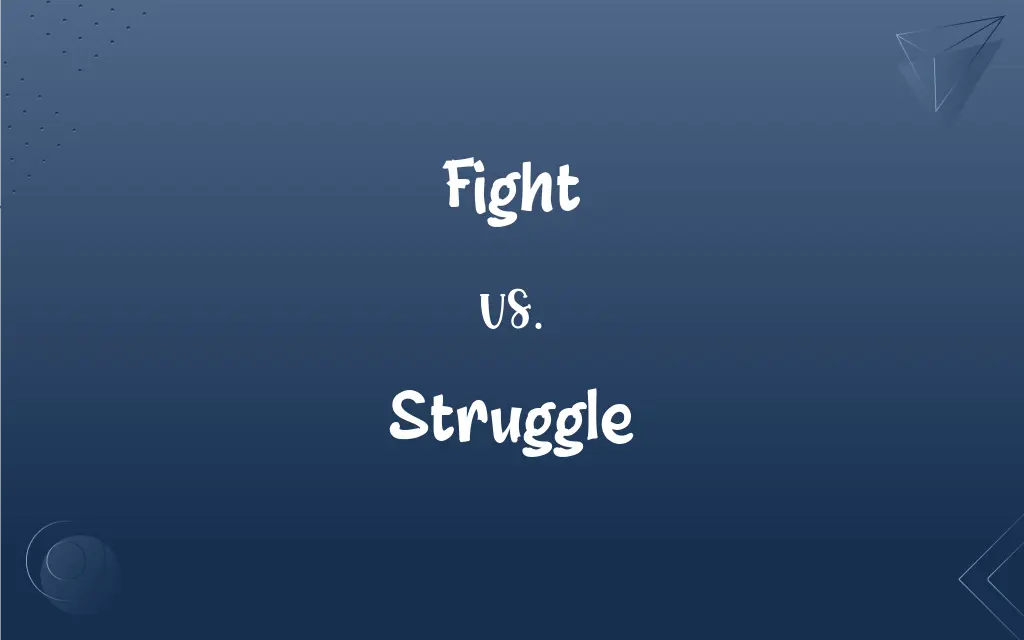Fight vs. Struggle: What's the Difference?
Edited by Aimie Carlson || By Harlon Moss || Updated on November 2, 2023
Fight implies a confrontation or conflict, often physical or competitive, while struggle denotes a challenging effort or attempt often against difficulty.

Key Differences
A fight is commonly understood as a physical confrontation or a battle between two entities. It can also refer to a spirited debate or an effort to overcome a problem. Struggle, on the other hand, connotes a broader sense of effort against difficulty, whether it’s personal, physical, or emotional. While a fight is often external, a struggle can be internal.
Fight often implies an active attempt to defeat something or someone, and it typically involves some form of aggression, whether in a literal or metaphorical sense. It’s a word that carries the intention of winning or overcoming an adversary. Struggle suggests an endeavor that is strenuous and challenging, often without the implication of an adversary, and it may not always have a definitive end or goal like a fight typically does.
In the context of a fight, there is usually a clear opposition or a challenge that one aims to defeat. It is used both for physical brawls and competitive scenarios as well as metaphorically in overcoming obstacles. Struggle, however, is often about dealing with challenges that are not necessarily personified or opposed. It is a term that encapsulates efforts against intangible challenges like poverty or addiction.
When considering legal or formal contexts, a fight might be used to describe the act of contending in a court of law or a sports match. Struggle, in this regard, is seldom used formally but tends to describe the efforts or campaigns against societal issues, personal demons, or physical handicaps. Fights are often about opposition and resistance, whereas struggles are more about endurance and persistence.
While both fight and struggle involve conflicts and challenges, the key difference lies in the nature of these terms. Fights are direct confrontations aiming to secure a victory, whereas struggles refer to the process of contending with difficult circumstances, which may or may not be against an opposing entity.
ADVERTISEMENT
Comparison Chart
Connotation
Aggressive confrontation or competition.
Effort against difficulties or challenges.
Opposition
Clear adversary or opposing force.
May not have a personified adversary.
Nature
Competitive and combative.
Effortful and persevering.
Contexts
Physical, legal, sports, debates.
Personal, emotional, societal issues.
Aim
To overcome, win, or defeat.
To endure, manage, or persist.
ADVERTISEMENT
Fight and Struggle Definitions
Fight
A physical altercation.
The fight outside the bar was quickly stopped by security.
Struggle
To exert effort against resistance.
He struggled to lift the heavy weights.
Fight
A battle against a disease.
His fight against cancer was inspiring.
Struggle
To strive to overcome difficulties.
She struggled with the difficult exam questions.
Fight
To strive for victory.
She will fight for the championship this weekend.
Struggle
To progress with difficulty.
They struggled through the dense forest.
Fight
To oppose strongly.
They will fight the new policy at the meeting.
Struggle
An internal conflict.
He faced an inner struggle with his conscience.
Fight
A competitive confrontation.
The fight for the title was intense.
Struggle
An ongoing effort in adverse circumstances.
The struggle for freedom lasted years.
Fight
To attempt to harm or gain power over an adversary by blows or with weapons.
Struggle
To exert muscular energy, as against a material force or mass
Struggled with the heavy load.
Fight
(Sports) To engage in a boxing match or other similar contest.
Struggle
To be strenuously engaged with a problem, task, or undertaking
Struggled for years before breaking through as an actor.
Fight
To engage in a quarrel; argue
They are always fighting about money.
FAQs
Can a fight be non-physical?
Yes, it can refer to any form of confrontation or competition.
Does a fight require an antagonist?
Typically, there is a clear opponent or challenge in a fight.
Can you struggle without an opponent?
Yes, struggles can be against non-personified challenges.
Can a legal battle be described as a fight?
Yes, legal confrontations are often referred to as fights.
Is struggle always negative?
Not always, it can also represent a valiant effort to overcome.
Is the outcome of a struggle always successful?
No, success is not guaranteed in a struggle.
Can someone struggle with themselves?
Yes, internal conflicts are common forms of struggle.
Are struggles always long-term?
Struggles can be both short-term and long-term challenges.
Can a fight be part of a struggle?
Yes, a fight can be an event within a larger struggle.
Can a struggle lead to personal growth?
Often, personal struggles contribute to growth and resilience.
Are struggles subjective experiences?
Yes, what one person finds challenging, another may not.
Does a struggle require physical effort?
A struggle can be physical, emotional, or intellectual.
Is a fight always between two parties?
A fight can involve two or more parties.
Can "fight" have a positive connotation?
Yes, when it’s used in the sense of striving for something good.
Are struggles always apparent to others?
No, some struggles, like mental health issues, may not be visible.
Is "struggle" used in sporting contexts?
Rarely, as sports usually involve direct competition or fight.
Is "struggle" used in military contexts?
It can be, but "fight" is more common in such contexts.
Does "fight" imply direct action?
Fight typically implies a more direct and active approach.
Can "fight" refer to a collective effort?
Yes, like in "the fight against climate change."
Can the outcome of a fight be a compromise?
It’s possible, especially in metaphorical fights like negotiations.
About Author
Written by
Harlon MossHarlon is a seasoned quality moderator and accomplished content writer for Difference Wiki. An alumnus of the prestigious University of California, he earned his degree in Computer Science. Leveraging his academic background, Harlon brings a meticulous and informed perspective to his work, ensuring content accuracy and excellence.
Edited by
Aimie CarlsonAimie Carlson, holding a master's degree in English literature, is a fervent English language enthusiast. She lends her writing talents to Difference Wiki, a prominent website that specializes in comparisons, offering readers insightful analyses that both captivate and inform.































































